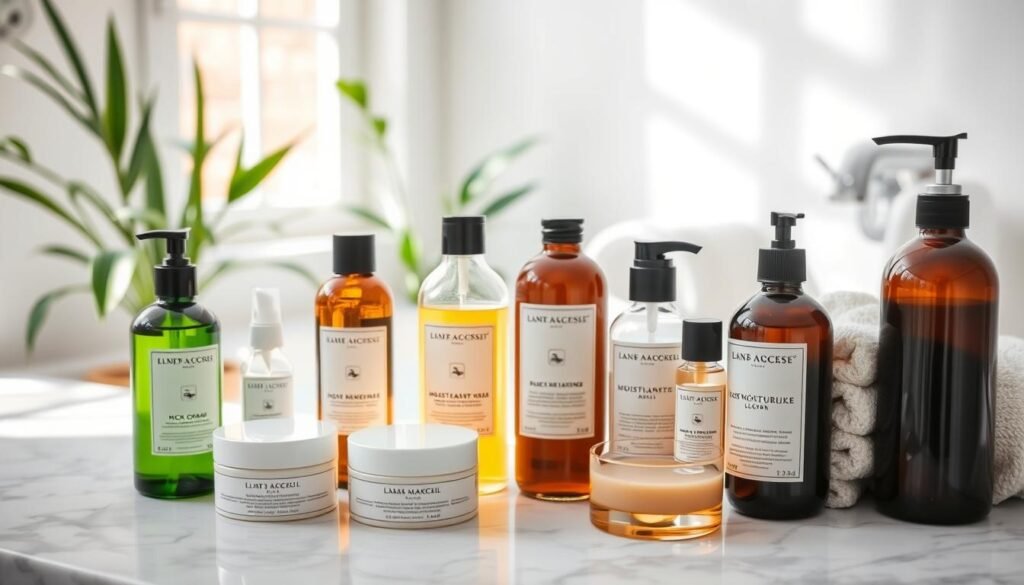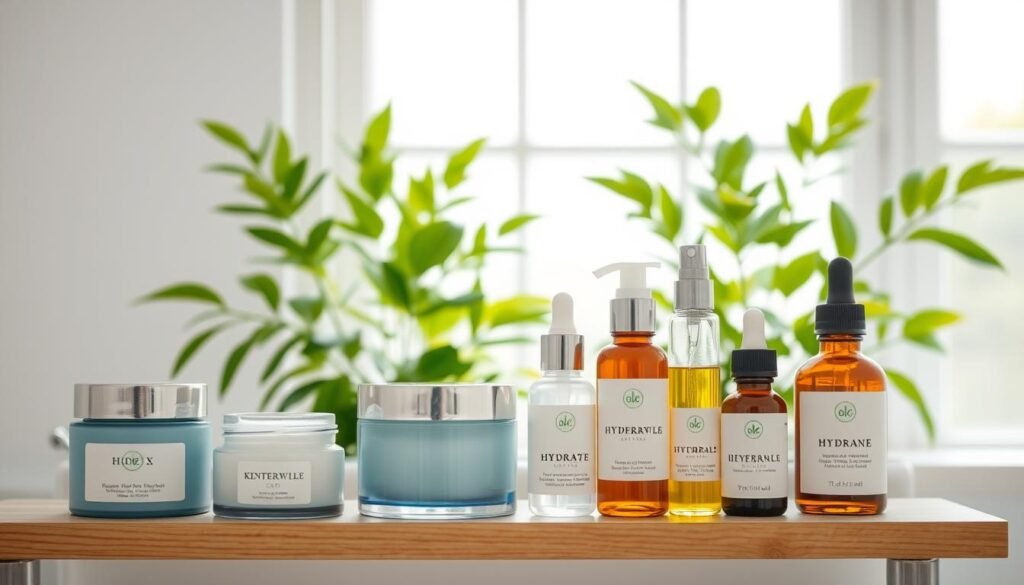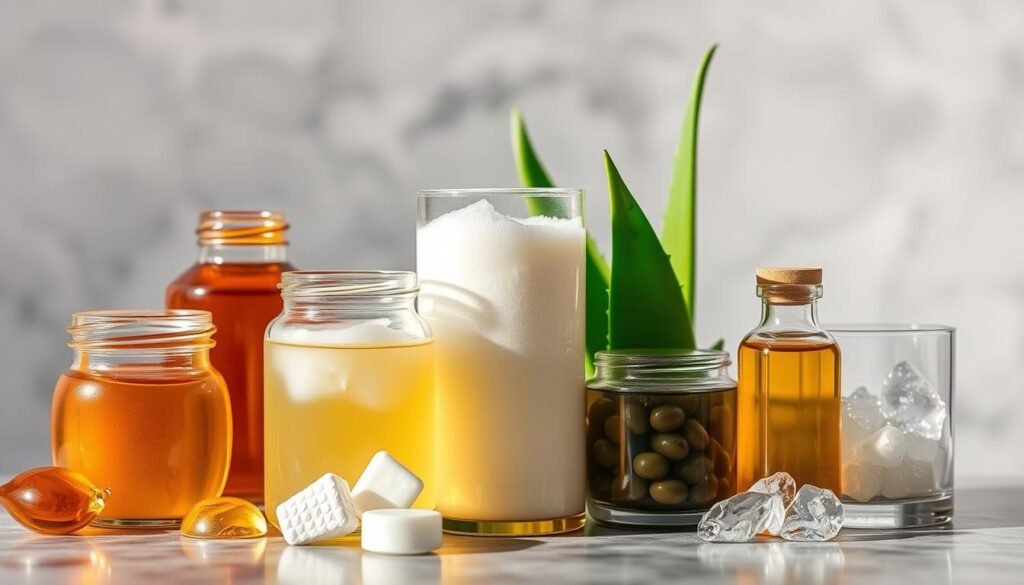Did you know about 10% of the American population has eczema at some time? This condition can greatly affect daily life. Thus, knowing how to moisturize right is vital for those with eczema-prone skin.
Moisturizing is essential in fighting the dryness and irritation from eczema. The right hydration practices offer quick relief. Additionally, they help keep the skin healthy over time.
In this article, we’ll uncover skin care specifically for eczema-prone skin. We’ll discuss techniques that ensure the skin stays hydrated and comfortable.
Key Takeaways
- Knowing how widespread eczema is shows why moisturizing correctly is key.
- Moisturizing is vital to ease dryness and irritation.
- Staying hydrated helps keep skin health in check.
- Finding the right skin products for eczema-prone skin is critical.
- Effective skin care routines can make life more comfortable for those with eczema.
Understanding Eczema and Its Impact on Skin Health
It’s key to understand Eczema to manage this common skin issue well. Eczema causes dry, itchy patches on the skin. It can lead to redness, swelling, and sometimes oozing in severe cases.
The skin barrier keeps out irritants and allergens. If damaged, it can lose moisture. This makes skin more irritated and prone to Eczema. Changes in the environment, stress, and allergens can make it worse.
Keeping the skin hydrated is crucial in controlling Eczema. A hydrated skin barrier can reduce irritation. It supports skin health, lessening symptom frequency and severity. Using effective moisturization techniques is a proactive step in Eczema care.
Moisturizing Techniques for Eczema Relief
Keeping skin healthy is key for those with eczema. Effective moisturizing is a big part of this. It’s a basic step in easing eczema symptoms. By applying moisturizers regularly, you can avoid dryness and keep the skin well-hydrated.
Importance of Regular Moisturization
Dermatologists stress the need for constant moisturizing for eczema sufferers. It helps prevent flare-ups and reduce irritation. The skin often loses moisture fast, especially in dry climates or when the seasons change. Using skin care items with emollients can trap moisture, helping skin heal. Also, strategies like the “Soak and Seal” method can boost moisture retention. More on this can be found in this resource.
Choosing the Right Products
Finding the right skin care items is crucial for eczema management. Look for moisturizers without fragrance to avoid skin irritation. Choose rich creams or ointments with natural elements to help heal. Products that form a barrier on the skin are great. They keep moisture in. Understanding product labels can help you find the best option for your skin.

| Type of Product | Benefits |
|---|---|
| Emollient Creams | Hydrates and softens dry skin |
| Ointments | Provides a protective barrier against moisture loss |
| Lotions | Easily absorbed, good for light moisture needs |
| Natural Oils | Rich in essential fatty acids, promotes skin health |
The Role of Hydration Routines in Skin Care
For healthy skin, especially if you have eczema, it’s key to moisturize daily. This not only eases symptoms but also makes your skin stronger. The trick is regular use and picking the right time to apply.
Daily Moisturizing Routines
Setting up a daily routine for moisturizing can make your skin better. It’s important to apply moisturizers often, especially after you bathe or wash your hands. This seals in moisture and stops your skin from getting dry. For those with delicate skin, pick moisturizers that don’t have scents or harsh stuff in them.
- Apply moisturizer immediately after washing the skin
- Utilize thick creams or ointments for intense hydration
- Consider layering products for added benefits
- Incorporate hydration-focused serums for extra support
Timing of Application
When you apply moisturizer is very important for keeping skin hydrated. Putting it on while your skin is damp helps trap more moisture. Applying it several times a day, especially when it’s dry or cold, helps even more. Knowing when to moisturize can make your skincare work better.

For more tips on hydration routines and custom advice, check out personalized skincare advice. They have great info on daily moisturizing tailored just for you.
Emollient Products: What to Look For
Finding the right emollient products is key to managing eczema effectively. People with eczema often have dry, irritated skin. So, picking the right moisturizer is vital for skin hydration and relief. Many ingredients can boost the soothing and hydrating effects of these products.
Some of the best ingredients in emollient products are:
- Shea Butter – Great for moisturizing, it nourishes and protects the skin.
- Glycerin – A strong humectant that draws moisture, keeping skin hydrated all day.
- Petrolatum – It acts as a barrier to prevent moisture loss, ideal for eczema-prone skin.
It’s important to know the difference between lotions, creams, and ointments for moisturizing. They vary in thickness and how well they absorb. This means they can meet different skin needs:
| Type | Texture | Best For |
|---|---|---|
| Lotions | Lightweight | Daily use for mild dryness |
| Creams | Thicker | Moderate to severe dryness |
| Ointments | Heavy | Severe dryness and irritation |
Using the right emollient products daily can greatly improve skin hydration. This also helps with overall skin health. Choosing products that suit your skin type and condition is crucial for the best care in managing eczema.
Humectant Ingredients: Why They Matter
Humectant ingredients are key in skincare, especially for those with eczema. They attract and keep moisture, boosting skin hydration. Knowing the benefits of humectants helps people choose the best products for healthy skin.
Popular Humectants for Eczema-Prone Skin
Some humectants are great for sensitive skin. Below are popular choices:
| Ingredient | Benefits | Usage |
|---|---|---|
| Hyaluronic Acid | Draws moisture from the air, holding up to 1,000 times its weight in water. | Commonly found in serums and moisturizers. |
| Urea | Enhances moisture absorption and has exfoliating properties to improve skin texture. | Often included in creams and lotions for dry skin. |
| Aloe Vera | Soothes irritated skin while providing moisture and a cooling effect. | Used in gels and creams, perfect for sensitive areas. |
Using these humectants daily can improve skin hydration. It also helps lessen symptoms for those with eczema-prone skin.

Facial Serums for Enhanced Hydration
For those seeking enhanced hydration, facial serums are key. They are a big deal in eczema skin care. These products are packed with active ingredients. They provide deep hydration alongside daily moisturizers. The right serum can greatly better skin texture. It promotes a healthier skin barrier, vital for any skincare routine.
Serums with niacinamide and hyaluronic acid are very beneficial. Niacinamide helps fix the skin barrier and lowers redness. This is perfect for those with sensitive skin or eczema. Hyaluronic acid is great at holding moisture, keeping skin hydrated longer. Together, these ingredients make the best hydration team.
Adding facial serums to your skincare routine boosts moisturizers‘ effects. Anyone looking for top products can check out reviews on Cosmopolitan. Using these top-notch serums keeps your skin well-hydrated and nourished.
| Ingredient | Benefits | Recommended Products |
|---|---|---|
| Niacinamide | Repairs skin barrier, reduces redness | The Ordinary Niacinamide 10% + Zinc 1% |
| Hyaluronic Acid | Attracts and retains moisture | Neutrogena Hydro Boost Water Gel |
| Vitamin C | Brightens skin, evens tone | Skinceuticals C E Ferulic |
Choosing the right facial serum can change eczema skin care for the better. Their focused formulas offer deep hydration. So, facial serums give people a strong way to get and keep enhanced hydration.
Effective Dry Skin Remedies
Dealing with dry skin, especially with eczema, is a tough battle. You must explore various remedies to find relief. Natural oils and rich butters are key for hydration. Over-the-counter products also play a big role in keeping skin moist.
Natural Oils and Butter
Natural oils are crucial for tackling dry skin. Coconut oil, argan oil, and olive oil dive deep to moisturize. They also reduce inflammation. Adding shea butter and cocoa butter to your daily care boosts hydration. Their thick texture seals in moisture, protecting your skin.
Over-the-Counter Options
OTC creams and ointments offer fast relief for dry skin. They’re great for eczema because they contain moisturizing ingredients. Glycerin and ceramides in these products help lock in moisture and stop water loss. Using them regularly can make your skin healthier. For more tips on moisturizing, visit this resource.
Supple Skin Secrets: Tips and Tricks
Dealing with eczema while keeping skin soft can be tough. Adding certain practices to daily life helps a lot with skin moisture and health. Here are some useful Eczema Tips and Skin Care Tips to keep in mind:
- Avoid hot showers, as they can strip moisture from the skin.
- Use lukewarm water instead, and limit shower time to 10 minutes.
- Incorporate a humidifier in living spaces to add moisture to the air.
- Choose breathable fabrics, such as cotton, to reduce irritation.
- Stay hydrated by drinking plenty of water throughout the day.
Diet is key for skin health. Eating foods rich in vitamins, minerals, and healthy fats helps keep skin hydrated. Omega-3 rich foods like fish and flaxseeds combat dryness and inflammation.
Dermatologists say small lifestyle changes can cut down on eczema problems. Lowering stress with relaxation or mindfulness may help the skin too. Proper skin care with these Natural Remedies improves results for eczema sufferers.
Conclusion
Effective moisturization is key for managing eczema and boosting skin health. This article talked about different ways to keep skin well-hydrated. We covered why it’s important to moisturize regularly and pick the right products.
Adopting a full plan means moisturizing often, using the best emollients, and following hydration tips. This can really improve your skin. Better skin repair, less swelling, and feeling more comfortable are some benefits. These gains come from using various moisturizing methods we discussed.
It’s critical for people with eczema to use these strategies for continuous relief. A steady skin care routine boosts skin health and confidence in handling eczema. Following the advice in this article helps folks improve their skin greatly.